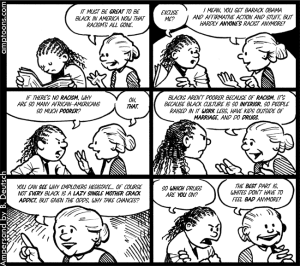Methodologically Eliminating Race and Racism by Carole Marks
For the first year and a half of my daughter’s life, Peek-A-Boo was a favorite game. The game was appealing to my young daughter as she developed her sense of object permanence. When she could not see me, (hands over eyes); then mommy disappeared. I relate this to this eye opening article and Marks example of “elimination process.”
The White majority believes that it has made substantial progress in the elimination of racism when in actuality; it is still thriving in the United States. The White majority is like my young toddler’s interactions with object permanence, if one chooses to not see racism it must no longer exist. Popular terminologies people use to describe their personal voids of racism are color blindness, racially pluralistic, and politically correctness. Marks attributes Alan Wolfe for labeling these people as “racial realists.”(p. 47). Racial realists believe that race is important, but it is overly exaggerated and politicized. They believe segregation and inequalities based on a person’s race are a part of America’s past history solved by the Civil Rights Movement. People that are marginalized and alienated in today’s society can attribute it to a lack of good citizenship and decent moral character. (p. 48)
I found that the following cartoon illustrates the misconceptions of many White Americans’ ideologies about a racist free America.
http://publichealthwatch.files.wordpress.com/2014/05/end-of-racism-comic.png
Marks gives the history of sociology as it has clumsily tried to study race and racism. She states “much of the time the sociological study of race has been haphazard and quixotic.” (p. 47). She argues that the field of sociology has overtime supported the theory of elimination process, by confirming, “The majority view that civil rights laws have ended racial inequality, that discrimination is in the descendancy and redress readily available for those wronged.” (p. 47).
Sociology has bumbled due to the ever dynamic and non-conforming aspects of race. Empirical researchers tried to use quantitative research to identify and measure differences. Biological research was not followed either. Natural scientists at the time argued that there were no outstanding differences based on genetics or phenotype markers. (p. 51).Sociology researchers have not been able to develop a solid theoretical foundation. The research that has been conducted is often filled with holes. Findings often reflect what was already known. The more affluent a person/family, accessibility is facilitated to better schools, jobs, housing, etc. Researchers question how they could study race beyond just, “social-psychological and social problems.” (p. 50) Biases from the researchers impeded them from being totally objective. Marks uses the following observation from Du Bois’s, Dusk of Dawn. “The best available methods of social research are at present so liable to inaccuracies that the careful student disclosed the results of individual research with indifference. “ ( p. 50).
Has sociology played a key role in the establishment and sustainment of racist notions that minorities are indeed a subordinate racial group, never able to reach the levels of the majority race in intellectual and moral capabilities? Yes, the pool of published researchers is relatively small white sociologists. African American sociology researcher’ articles and studies were systematically not published in major journals. Their writings and research were judged to not fit into the guidelines of acceptable research. (p.54). All research being read and published was from a non-minority perspective. It was the dominate culture’s truth and reality being published, read and ultimately accepted by mainstream America on truths about race. “The production of knowledge about race, (gender and class) is controlled by small, mostly male, mostly White elite who perpetuate their power by designating, among other things, good and bad scholarship. Good scholarship on race, using large data sets and sophisticated “scientific” techniques, gets published.”(p. 52).
Marks concludes the article with uncertainly of the next step to take to amend the detrimental ambiguities in research conducted by fellow sociologists. Expecting others to easily change traditional practices and views is hopeful at best. Research needs to be humanized. Race needs to be studied through participation, personal experiences and interaction, not just from a far away stance judging of differences. Articles and studies from minority researchers have to be included and accepted in the major journals.
As a researcher, Marks’ study scared me. As a student we are taught to believe what is read. If “experts” are writing it then it is to be considered truth. The real question is who’s truth is it? From what bias or preconceived beliefs infects their studies and findings. As a classroom reading teacher, I am going to add the element of researching about the author to my curriculum . I want my students to learn to not accept everything at face value, but to delve deep and comprehend the authors motives in what they read.
Most importantly Americans need to pull down our hands that cover our eyes in order to clearly recognize that racism is not a problem of the past. All members of research and academia must acknowledge its harmful effects of on our society and collaboratively work to improve America’s reality for all humanity.
Marks, Carole. (2008). Methodically Eliminating Racism, White logic, White methods, Bonilla-Silva and Zuberi editors. Lanham: Rowman &Littlefield Publishers.
Connie Hahne
Latest posts by Connie Hahne (see all)
- Where is the humanity in education? – June 20, 2014
- Writing the truth – Connie Hahne – June 17, 2014
- Preparing teachers for diversity – June 13, 2014
- The Untangling of Racism in Education – June 7, 2014
- A New Generation of Researchers – June 3, 2014
